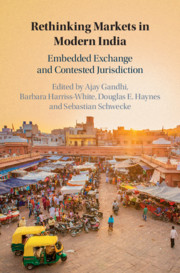Book contents
- Rethinking Markets in Modern India
- Rethinking Markets in Modern India
- Copyright page
- Contents
- Figures
- Tables
- Contributors
- 1 Markets in Modern India: Embedded, Contested, Pliable
- 2 Banking in the Bazaar: The Nattukottai Chettiars
- 3 Space in Motion: An Uneven Narrative of Urban Private Property in Bombay
- 4 Magic of Business: Occult Forces in the Bazaar Economy
- 5 Vernacular Capitalism, Advertising, and the Bazaar in Early Twentieth-Century Western India
- 6 The Artifice of Trust: Reputational and Procedural Registers of Trust in North Indian “Informal” Finance
- 7 Mandi Acts and Market Lore: Regulatory Life in India’s Agricultural Markets
- 8 The Market and the Sovereign: Politics, Performance, and Impasses of Cross-LOC Trade
- 9 Brandism vs. Bazaarism: Mediating Divinity in Banaras
- 10 Black Money in India: Fighting Specters and Fostering Relations
- 11 Market Making in Punjab Lotteries: Regulation and Mutual Dependence
- 12 Liquid Assets: Transactional Grammars of Alcohol in Jharkhand
- 13 Building on Sand? Criminal Markets and Politics in Tamil Nadu
- Index
- References
6 - The Artifice of Trust: Reputational and Procedural Registers of Trust in North Indian “Informal” Finance
Published online by Cambridge University Press: 24 September 2020
- Rethinking Markets in Modern India
- Rethinking Markets in Modern India
- Copyright page
- Contents
- Figures
- Tables
- Contributors
- 1 Markets in Modern India: Embedded, Contested, Pliable
- 2 Banking in the Bazaar: The Nattukottai Chettiars
- 3 Space in Motion: An Uneven Narrative of Urban Private Property in Bombay
- 4 Magic of Business: Occult Forces in the Bazaar Economy
- 5 Vernacular Capitalism, Advertising, and the Bazaar in Early Twentieth-Century Western India
- 6 The Artifice of Trust: Reputational and Procedural Registers of Trust in North Indian “Informal” Finance
- 7 Mandi Acts and Market Lore: Regulatory Life in India’s Agricultural Markets
- 8 The Market and the Sovereign: Politics, Performance, and Impasses of Cross-LOC Trade
- 9 Brandism vs. Bazaarism: Mediating Divinity in Banaras
- 10 Black Money in India: Fighting Specters and Fostering Relations
- 11 Market Making in Punjab Lotteries: Regulation and Mutual Dependence
- 12 Liquid Assets: Transactional Grammars of Alcohol in Jharkhand
- 13 Building on Sand? Criminal Markets and Politics in Tamil Nadu
- Index
- References
Summary
This chapter studies the operation of trust on financial markets in the North Indian city of Banaras (Varanasi). It emphasizes an interpretation of trust on markets as an artifact and artifice based on an experiential category of practical knowledge used to handle exchange under conditions of high uncertainty, and identifies two distinct patterns in its handling, marked as procedural and reputational registers of (handling) trust. The first case analyzes the difficulties faced by locally operating banks in the mid-twentieth century to shift from reputational to procedural registers of handling trust, using banking advertisements and other archived material. The second case outlines the shifts in the manner reputational registers of trust are used in extra-legal money lending in the wake of Indian legislation against these financial practices, contrasting an ethnographic study of contemporary practices to historical sources on money lending in the first half of the twentieth century.
- Type
- Chapter
- Information
- Rethinking Markets in Modern IndiaEmbedded Exchange and Contested Jurisdiction, pp. 147 - 178Publisher: Cambridge University PressPrint publication year: 2020

